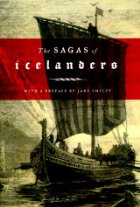
I LOVED the Icelanders sagas. For a long time I was drawn to the attractively-bound paperback tome in Powell's, but I kept arguing with myself: would I actually read it? Did I really need a huge book of medieval Icelandic literature taking up shelf space? Wouldn't it just sit around on my to-be-read shelf and gather dust? Finally, I caved and bought it, and immediately devoured the entire thing in a voracious style usually reserved for Nancy Drew mysteries.
Most of the medieval or ancient literature I've read features very large-scale action, adventure of epic proportions. You've got Achilles and Odysseus enlisting the gods to help them battle their larger-than-life adversaries, Beowulf trudging out of the blood-spattered hall to slay great monsters and their mothers, or impossibly pure-hearted knights wooing sickeningly pure maidens. The Icelandic sagas have adventure too, and a good deal of trudging, and a fair amount of bloodshed, but there's something intriguingly domestic about them as well. They are about settlers to a forbidding new place, hardy men and women who claim homesteads and raise families in a climate even harsher than the one they left behind in Norway. Although much of the narrative is devoted to feuds between clans, which usually end up being settled by multiple murders, just as much space is taken up with the everyday lives of families, how hard-as-nails farmers gradually increased their wealth and made lives for themselves, showing proper hospitality with presents and feasts when neighbors or family members came to visit, how these farmers' equally tough wives bore them children and how these children gradually came of age as Icelanders. I love the contrast between the outlandish scenes of bloody battle, in which men with berserker blood shift into fierce monster-animals, and the proto-novelistic tales of everyday life. The Sagas portray the birth of a nation as the merging of these two contrasting elements (the outlandish and the domestic), which is a profound view of history that seems surprisingly contemporary.
The characters, in some cases, are more dynamic than any other medieval literature I've read, starting out as Norwegians who claim they would never emigrate to "that god-forsaken fishing hole," but ending up as Icelanders with lives and roots on the island. Whatever they are, it is never near-divine heroes or rose-scented virgins, just strong, flawed people doing their best given the circumstances. Gender roles are also surprising at times, as some of the fiercest and most warlike characters are women. (Not that "warlike" is objectively better than more traditionally feminine qualities, but it's nice to be surprised sometimes.) In addition, whether it's because of my Norwegian ancestry or my kinship to the novelistic form and the history of the everyday, these stories seemed oddly familiar to me, despite the gap of 800 years and as many miles separating me from their composition.
And, of course, there is the fact that nearly all the men in these stories have "Thor" somewhere in their names, which should win points for them if nothing else does. Who wouldn't want to read about Thorstein's travels with his brother Thorgrim and son-in-laws Thorarin and Thorkel? I ask you.

